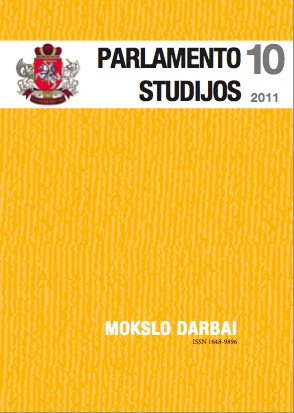The Pathos of Welcome Addresses of the Constituent Assembly
DOI:
https://doi.org/10.51740/ps.vi10.303Keywords:
The Constituent Assembly of Lithuania, figures of speech, orators’ addresses, Juozas Tumas-Vaižgantas, Juozapas Skvireckas, Antanas Smetona, Gabrielė Petkevičaitė-Bitė, Aleksandras StulginskisAbstract
The spring of 2011 marks 91 years from the first celebratory sitting of the Constituent Assembly of Lithuania. “15 May 1920 will and must remain a memorable date for us, just like the 16th of February, the date when Lithuania’s independence was declared. The fact that the Council, the Seimas, formed by our people represents the true freedom, not a promise on paper anymore, raises the Constituent Assembly above all other acts of our nation recorded in our history,” said Juozas Tumas-Vaižgantas, the then popular writer, public figure and priest. Finally, after a democratic election, the Lithuanian nation stated their will and elected their representatives who had to defend the nations’ interests. The principal goal of the Constituent Assembly was to lay the foundation of statehood and create the systems of governance and economy. The activities of the Constituent Assembly lasted for two years. The Constitution of the State was adopted, a new monetary system was introduced and the land reform was launched. However, the birth of the Constituent Assembly was not easy. M. Krupavičius draws a vivid comparison describing Lithuania as “empty, swept as a granary in spring – no trains, no guns, no soldiers, no treasury, no administration”. It may be the reason for awaiting the Constituent Assembly as the greatest miracle, the realisation of freedom that came true. Even several imposing gates of honour were built and decorated by the then best painters for the entrance of that symbol of freedom. The mood of anticipation that is difficult to describe – kind of mystic spirits – which just lingered in Kaunas Cathedral, Laisvės Avenue, the city garden, streets and the Theatre, in which the first sitting was held, is reflected in the addresses delivered on that occasion by the then most prominent orators: Juozas Tumas-Vaižgantas, Antanas Smetona, Gabrielė Petkevičaitė-Bitė and Aleksandras Stulginskis. These addresses, being important historical documents, have not been analysed from the rhetorical perspective so far. Each of them is distinctive, since the orators were rather different and different was their rhetorical background, status and occupation: from priest to agronomist. Nevertheless, these addresses are related by a common pathos; they all were delivered on the occasion of the first sitting of the Constituent Assembly; and the orator personalities belonged to an elite of that time – they were the most prominent, widely known and noted political figures in Lithuania.








 The metadata of the scholarly journals and publications of the Lithuanian National Martynas Mažvydas Library is distributed by
The metadata of the scholarly journals and publications of the Lithuanian National Martynas Mažvydas Library is distributed by 